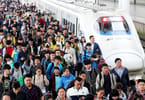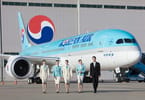BANGKOK, Thailand – For once, Thai authorities will have to do more than just try to fix its image without really solving any problems. For many years, Thailand’s government has been warned about regular shortcomings in the way Thailand Civil Aviation (DCA) looks at safety issues.
A year ago, the International Civil Aviation Organization (ICAO) addressed a warning to the Thai DCA to rapidly find solutions to redress the lack of resources to the agency. In March, the DCA’s plan for a turn-around over the next two years was rejected by the ICAO which asked for “immediate corrective measures” instead. The international organization mentioned “significant safety concerns” over DCA’s ability to fix the rules and have them respected.
The agency is indeed understaffed with the same number of employees since over a decade ago. In a decade’s time, air traffic doubled in Thailand jumping from 300,000 to 600,000 movements a year. ICAO warnings to the Thai civil aviation agency go back to 2009 without any effect.
ICAO’s statement highlights what has been done for many years: sweeping issues under the rug until they are forgotten. This happened in the past with Phuket Airlines and Orient Thai aviation – two Thai licensed air carriers with extremely poor safety records. Despite incidents and even a crash at Orient Thai, DCA never suspended those airlines’ licenses. ICAO points out that concerns about safety had mainly to do with air operator certification, issuing of operation specifications, and their hazardous goods transportation certification.
ICAO’s report had immediate consequences: Japan, Korea, and China immediately banned new charter flights and blocked current Thai airlines, including Thai Airways from adding additional services. China and now Singapore are looking to act similarly. In Europe, EU authorities are observing Thailand’s situation and could eventually declare a ban on Thai carriers in Europe’s skies. Such a move would be catastrophic for Thai airlines and the tourism industry. Thai carriers currently represent almost 50% of all seats offered between Europe and Thailand, and over 60% of all seats between Australia/New Zealand and Thailand. Australia announced it will now be carefully watching further development related to these safety issues.
As an example, bans imposed by China, Japan, and South Korea are likely to impact 150,000 travelers in the next 2 months despite the fact that Japan temporarily lifted its ban until the end of June. However, all Thai aircraft will now be inspected after landing in Japan by a Japanese team of experts.
In Thailand, the government is suddenly feeling the heat and admits that the situation is turning critical. A potential ban on Thai airlines will be considered as a humiliation for the authorities, and it will also jepopardize the recovery of tourism, an important component of Thailand’s national economy. The government must now act very swiftly to avoid a world contagion.
Prime Minister Prayut Chan-o-cha recognized that little has been done to solve the problems over years. An emergency law – Article 44 – under the temporary constitution which was drawn by military will be implemented. This law has been activated by the government and is replacing the lifted martial law. It gives to the Prime Minister sweeping power to intervene without any consultation of legal bodies in the face of any perceived threats to national security, the economy, the monarchy, or state affairs. Article 44 could then be used as well to speed up the cleaning of Thailand’s DCA. In that case, the Prime Minister could attribute budgets and restructure the agency without going through normal procedures and save time in the process. There have been talks about hiring foreign experts, for example.
Collateral damage is likely for the Thai aviation industry with possibly many travelers choosing now to visit the kingdom by choosing a foreign carrier instead of Thai Airways International. In the long term, ICAO’s warning will suit Thailand’s Civil Aviation well by finally creating the basis for practices matching the highest international safety standards.
WHAT TO TAKE AWAY FROM THIS ARTICLE:
- A potential ban on Thai airlines will be considered as a humiliation for the authorities, and it will also jepopardize the recovery of tourism, an important component of Thailand's national economy.
- A year ago, the International Civil Aviation Organization (ICAO) addressed a warning to the Thai DCA to rapidly find solutions to redress the lack of resources to the agency.
- It gives to the Prime Minister sweeping power to intervene without any consultation of legal bodies in the face of any perceived threats to national security, the economy, the monarchy, or state affairs.






















